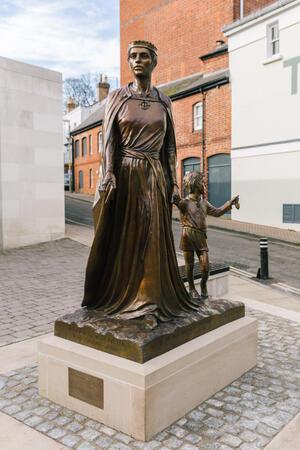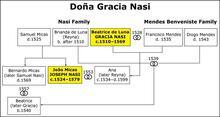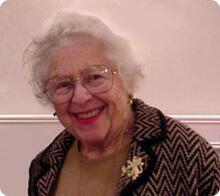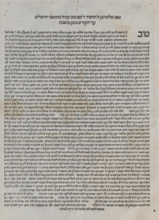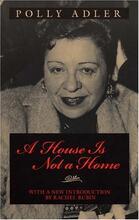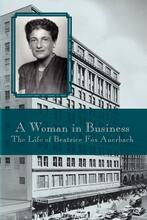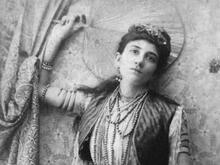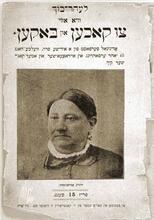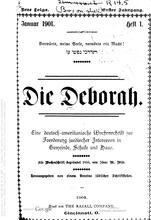Licoricia of Winchester
Licoricia of Winchester was an active businesswoman in thirteenth-century England. Her second husband was one of the richest Jews in England at that time. After his death in 1244 and the payment of the death duties (a part of which was used for the building of a chapel in Westminster Abbey), Licoricia controlled substantial wealth. She carried on David's business dealings and started new ones of her own. Her clients included King Henry III and some of his entourage as well as other members of the nobility in southern England. In 1277, Licoricia was found stabbed to death, possibly during a robbery, with her maid. There is no record of anyone being charged or found guilty of the murders.
Licoricia’s Two Marriages and Moneylending
Licoricia of Winchester, daughter of Isaac, was the most notable English Jewish woman of her time. She was born sometime towards the beginning of the thirteenth century and was married twice. After the death of her first husband, Abraham, son of Isaac, of Kent and Winchester, Licoricia continued living in Winchester with her three sons, Cokerel (Isaac), Benedict (Baruch), and Lumbard, and perhaps a daughter, Belia. The first documented evidence of Licoricia’s lending activities is from the early 1230s, when the records show that she lent money in association with other Jews as well as by herself with an attorney. By the end of that decade, she was one of the richest Jewish moneylenders in Winchester.
Licoricia’s second marriage took place in 1242 to one of the wealthiest of all English Jews of that time, David of Oxford. In order to marry Licorica, David had to divorce his first wife, Muriel. A complex legal battle ensued, involving David, Muriel, and her supporters, an English Lit. "house of judgement." Jewish court of lawbet din, the Paris bet din, King Henry III of England (1207–1272, crowned 1216), and the Archbishop of York, Walter de Grey (c. 1188–1255). After the divorce and Licoricia’s marriage to David, she settled in Oxford, where she gave birth to their son, Asser, also called Sweetman. There she assisted David in his business dealings.
Taking on and Expanding Her Husband’s Business
When David died only two years later, in February 1244, all the chests across the country that contained the official records of the debts owed to him were sealed and taken to the Jewish Exchequer in London for assessment. In order to prevent any attempt at interference by Licoricia, she was immediately imprisoned in the Tower of London until this process was completed. The price of her repurchase of all the debts owed to David was set at five thousand marks, of which four thousand was to go to the special exchequer established at Westminster Abbey for the building of a chapel to house a new shrine to Edward the Confessor (1003–1066).
Released in September 1244, Licoricia returned to live with her family in Winchester. She immediately began to carry on with David’s business enterprises and started new ones of her own. She frequented King Henry’s court whenever he was in Winchester, dealing with members of his entourage as well as with the King himself, who aided her in some of her more questionable activities. One of these cases occurred in 1253, when the heir of Sir Thomas of Charlecote took Licoricia to court for retaining custody of his late father’s estate, which had been pledged to her. Because the King had given her permission to occupy it for three times longer than the time permitted, Sir Thomas tried to remove her from the jurisdiction of the court but was not completely successful. Eventually Licoricia was found guilty, but before the court could arrive at its own penalty, the King himself interceded to limit her fine to one half a mark.
Licoricia’s ease of access to the King was an asset to the Jewish community, and individual Jews often turned to her to intercede for them. In 1258, Belia of Bedford, another Jewish moneylender who had been a partner of Licoricia’s in a Winchester deal in 1234, sent Licoricia a precious gold ring as a gift to the King. The ring was mislaid and Ivetta, a neighbor, accused Licoricia of stealing it. Licoricia was again sent to the Tower while the accusation was investigated. She was released when Ivetta herself was found to have been the thief.
Despite the huge fine she had paid to the King for David’s chattels, Licoricia had been left in control of enough wealth—both her own and David’s— to enable her to engage in substantial and widespread business activities. She remained an active moneylender for the next thirty years or more.
Many of Licoricia’s clients were members of the royal family, the aristocracy, and the Church. She also lent to other Jews, local landowners, and small farmers. Licoricia’s name consistently appears in the financial records of the time, often with one of her sons, in disputes over business matters. These disputes appear in the Calendar of Rolls of the Jewish Exchequer and in other official records. Her business dealings extended over southern and southwestern England and, until her later years, she moved regularly around the country managing her assets.
Murder
In 1277 Belia, Licoricia’s daughter, found the bodies of Licoricia and of Alice of Bicton, her Christian maid, stabbed to death in Licoricia’s home in Winchester, possibly murdered during a robbery. The amount stolen was rumored to be the unlikely sum of ten thousand pounds.
The authorities were concerned more with the theft of Licoricia’s property before it could be assessed than with the murder. Several men were accused of the theft, and a poor saddler who had fled the city was named as the murder suspect by the local tribunal. However, there is no record of the saddler or anyone else being tried and found guilty.
Licoricia was probably buried in the Jewish cemetery at Winchester.
Legacy
In early 2021, the Jewish community of England raised money to erect a life-size statue of Licoricia and her son, Asher, by Ian Rank-Broadly. The statue was placed outside of the Discovery Centre (library) on Jewry Street in Winchester, close to the medieval Jewish quarter, and was unveiled on February 10, 2022, by the Lord Lieutenant of Hampshire Nigel Atkinson. The Jewish community was represented by the chief rabbi of the United Hebrew Congregations of the Commonwealth, Ephraim Mirvis. On March 3, 2022, the statue was visited by Prince Charles (later King Charles III).
Licoricia of Winchester: Power and Prejudice in Medieval England, by Rebecca Abrams, was commissioned and lessons for the Hampshire county school children have been prepared, in order to publicize aspects of the history of medieval English Jews.
Abrams, Rebecca. Licoricia of Winchester: Power and Prejudice in Medieval England. Unicorn Publishing Group, 2022.
Adler, Michael. “The Jewish Woman in Medieval England.” In The Jews of Medieval England, edited by Michael Adler, 17–42. London: E. Goldstein, 1939.
Bartlet, Suzanne. “Three Jewish Businesswomen in Thirteenth-Century Winchester.” Jewish Culture and History 3:2 (2000): 31–54.
Bartlet, Suzanne. Licoricia of Winchester: Marriage, Motherhood and Murder in the Medieval Anglo-Jewish Community. London: Vallentine Mitchell, 2009.
Brown, Reva Berman and Sean McCartney. "David of Oxford and Licoricia of Winchester." Jewish Historical Studies 39 2004: 1-34.
Cohen, Sarah. “The Oxford Jewry in the Thirteenth Century.” Jewish Historical Society of England: Transactions. 13 (1932–1935): 293–322.
Davis, Myer D. “An Anglo-Jewish Divorce, A.D. 1242.” The Jewish Quarterly Review 5 (1893): 158–166.
Dobson, Richard Barrie. “The Role of Jewish Women in Medieval England (Presidential Address).” In Christianity and Judaism: Studies in Church History 29, edited by Diana Wood, 145–168. Oxford: 1992.
Keene, Derek. Survey of Medieval Winchester. Winchester Studies, vol. 2. Oxford: Clarendon Press, 1985.
Licoricia of Winchester website. https://licoricia.org/
Tallan, Cheryl. "Structures of Power available to two Jewish women in thirteenth-century England." Proceedings of the Twelfth World Congress of Jewish Studies Division B 85*-90* 2000.

